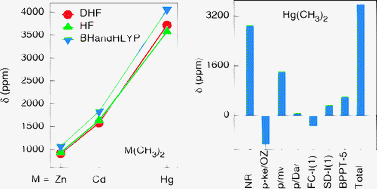Relativistic effects on group-12 metal nuclear shieldings†
Abstract
The leading-order perturbation theory approach to relativistic effects on the nuclear magnetic shielding provides an economic method for obtaining the chemical shifts in heavy-element containing systems. The method features detailed analysis potential in terms of the different physical mechanisms affecting the shielding tensors of heavy nuclei. The perturbative nature, however, results in an increasing error with increasingly heavy elements in the system. In this work, we investigate the performance of the Breit–Pauli perturbation theory (BPPT) against fully relativistic four-component theory in computing the nuclear shielding constants as well as the chemical shifts with respect to corresponding atomic ions of group-12 metals, M = Zn, Cd, and Hg, in dimethyl M(CH3)2 and aqueous M(H2O)62+ complexes. It is shown that five out of the total of sixteen BPPT correction terms are responsible for most of the relativistic corrections for the chemical shift of studied metals. The relativity is important already for Cd and BPPT is proven to work well up to Hg for the chemical shift, as calibrated with the fully relativistic method.


 Please wait while we load your content...
Please wait while we load your content...